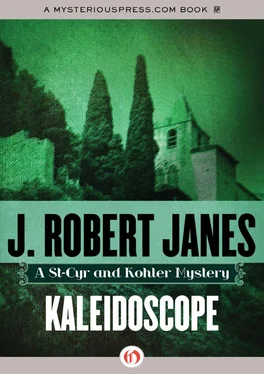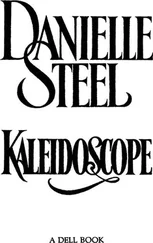J. Janes - Kaleidoscope
Здесь есть возможность читать онлайн «J. Janes - Kaleidoscope» весь текст электронной книги совершенно бесплатно (целиком полную версию без сокращений). В некоторых случаях можно слушать аудио, скачать через торрент в формате fb2 и присутствует краткое содержание. Год выпуска: 0101, Издательство: MysteriousPress.com/Open Road, Жанр: Исторический детектив, Полицейский детектив, на английском языке. Описание произведения, (предисловие) а так же отзывы посетителей доступны на портале библиотеки ЛибКат.
- Название:Kaleidoscope
- Автор:
- Издательство:MysteriousPress.com/Open Road
- Жанр:
- Год:0101
- ISBN:нет данных
- Рейтинг книги:3 / 5. Голосов: 1
-
Избранное:Добавить в избранное
- Отзывы:
-
Ваша оценка:
- 60
- 1
- 2
- 3
- 4
- 5
Kaleidoscope: краткое содержание, описание и аннотация
Предлагаем к чтению аннотацию, описание, краткое содержание или предисловие (зависит от того, что написал сам автор книги «Kaleidoscope»). Если вы не нашли необходимую информацию о книге — напишите в комментариях, мы постараемся отыскать её.
Kaleidoscope — читать онлайн бесплатно полную книгу (весь текст) целиком
Ниже представлен текст книги, разбитый по страницам. Система сохранения места последней прочитанной страницы, позволяет с удобством читать онлайн бесплатно книгу «Kaleidoscope», без необходимости каждый раз заново искать на чём Вы остановились. Поставьте закладку, и сможете в любой момент перейти на страницу, на которой закончили чтение.
Интервал:
Закладка:
Warily Fratani flicked his dark eyes from one to the other of them but said nothing.
The house of the weaver – what could he say about it in the silence of this place? The rear courtyard was the floor of a small, twelfth-century abbey whose grey and broken walls of stone still stood about. Arched doorways led out into the surrounding cemetery; pillars held up bits of makeshift roof upon which the tiles had been rescued, no doubt, from the very ruins of the stables.
Perhaps thirty large amphorae and storage jars of terracotta stood about, a whole collection of them. Most were of a burnt dark brown or greyish brown; some of that dusty, ochrous red so common to the hills. Roman and Greek they were and he wondered at the penchant for collecting them since, apart from a few which held lemon and orange trees – a sort of nursery perhaps – most collected only rainwater and thus would raise mosquitoes in season.
Unless … he said. And peering into one, saw the thin film of iridescence. A drop or two of oil to starve the hatching larvae of much-needed oxygen.
The courtyard held scattered clumps of mimosa and juniper taken from the hills, with thyme and rosemary and sage. Naked grapevines climbed the highest of the walls next to the rickety ladder that had been used in the harvest and simply left for the pruning.
There were potted herbs and winter beans, several squares of soil which had obviously been carted in from the surrounding cemetery in order to raise the crops so necessary to sustain life. Carrots, beets, potatoes – by their frozen, dead tops, St-Cyr named them off and wondered at the chanciness of storing such things in the ground. Brussels sprouts were grown as well, cabbages too, and leeks – good ones. He could smell the soup the leeks would make.
There were apricot and lemon trees, no figs or quince, a puzzle simply by their omission, for whoever cared for this shambles of a garden, did care for its wildness and sought not to tame it too much.
To enter the house, he went in under a makeshift arbour of grey branches wound with wisteria and trumpet vine to a small handful of storage jars in which the roots were anchored.
There was a sturdy rocking chair beside an iron-grilled window whose wall was cracked; a throw rug of earthy red upon which danced an electric design of saffron.
Sabots and espadrilles lay side by side on the rush mat beside a potted palm and two ancient rhododendrons. The door was of that same powder-blue as at the front but open a crack. Ah no, what has happened here? he asked.
Nudging the door open farther, he stepped inside to all but close it behind him. Drew in the heady scents of the hills, the sharp musk of wool that was being dyed.
Bunches of herbs hung above the disused stone fireplace of what had once been the monks’ kitchen. A straw hamper, a wide-brimmed sun-hat, a wicker basket of gardening tools, canvas apron, a pair of rubber boots – he took them all in. ‘Mademoiselle …?’ he tried. ‘Is anyone here?’
He should have rung the front bell, should have yanked on its rusty chain. Could not have used the key he’d brought, not yet, ah no. Not without the warrant and for that he would have needed the magistrate to accompany him.
One must go easily.
Committed, St-Cyr pressed on, finding the present kitchen on the other side of the fireplace, its ashes cold. Here disorder was laid above order. Agitation was in the unwashed dishes, the bits of bread and cheese that had been picked up and put down with hardly a nibble. The glass of wine that had not been touched.
The kitchen was typically Provencal. Low beams, copper pots, an all but empty screened cupboard-box to air the cheeses and the butter. Pate in a stone crock. Vinegar and oil in pale green bottles, mixed with various herbs. Fennel in one; dill in another.
The sitting-room was large, the floor of the same brick-red tiles, the chairs of woven hemp and modern – pale gold with soft beige cushions. Light … light everywhere streaming in to touch the tapestries. ‘Ah, Mon Dieu ,’ he whispered. ‘I am in the presence of a master.’ The weaving was superb. Everywhere he looked there was this presence, this uniqueness, that feeling only the true artist can engender solely by exposing his or her work to view. ‘Mademoiselle …?’ he asked again. Still there was no answer. This troubled him; this made him think he’d come upon another murder and he asked, So soon? and was afraid.
Then he heard the tiny, brittle sound of beechwood shuttles as they knocked against each other, and he followed it. Saw on the landing one of the tapestries from the villa near Chamonix. Was rocketed right back in time the nine years to the murder of Stavisky.
Felt the villa, smelled the warm aroma of a small cigar, and looked up still, could not have moved. Was transformed.
The tapestry flashed spears of colour laid upon one another as a bird’s wing-feathers are when preened. Mirrors of whites, blues, browns, greys, reds, greens and yellows blending into a pattern that was absolutely magnificent, the texture almost that of banded cornelian yet touched with fine lines and waves of purplish blue and of so many other colours and shades. Washes of the same as well.
He heard the pistol shot. He caught a breath, fought through the web of time and panic – forced himself to break away and run up the last of the stairs and along the hall.
There had been no gunshot.
She was sitting behind the upright loom with the sun over a shoulder, and he saw her first through the vertical threads of the warp and the design she had drawn upon it. Eyes downcast, the left hand momentarily up and pressed gently flat against the warp; the right hand out of sight behind the tapestry, holding one of the bobbins. The lashes long and dark black, the hair black and loose and spilling outwards to the shoulders, the face half obscured by the dye of the design, the head bent as if in prayer. The concentration absolute.
‘Mademoiselle …?’ he began.
‘Ah!’ she gasped and in that instant his mind flew back to Chamonix and he saw the dark grey-blue of those eyes as they had looked at him then but where? Where had he seen them? Not in the villa? Not on those stairs?
Dark and so very afraid as now.
‘What the hell do you want?’ she demanded, the accent all too clear. ‘Can’t you see that I’m working?’
It was no use. He was the same. He hadn’t changed one bit. Oh he was shabbier, a little older, yes, but some men never change. They’re born into middle age and he was exactly as she remembered and like a face out of the darkness. Why had he come?
‘Mademoiselle …?’
He didn’t remember – could that be possible? she asked herself. ‘Mademoiselle Viviane Darnot. Now how the hell did you get in here and what the hell do you want?’
He would keep the voice steady. ‘Mademoiselle Darnot, I am Jean-Louis St-Cyr of the Surete Nationale.’
She would not move, would stare at him from behind the warp. He must not realize who she was.
‘Your friend, mademoiselle …’
‘Is dead. Yes, I know about that but can tell you nothing. Now please, Inspector, I must catch the light on the threads, yes? Otherwise it will not guide my fingers.’
And I cannot work for more than a few hours a day, as a result – was that it? wondered St-Cyr, and knew it was so. ‘Who murdered her?’ he asked.
The eyes flew up, the left hand gripped the threads, then quickly released them. ‘Murdered …? It was an accident and nothing … nothing I can do will ever bring her back to me.’
‘A hunting accident?’ he persisted.
Why did he look at her the way he did, if not to tug at memory’s door? ‘An accident. Ludo came to see me right away. He … he knew it … it would all be so hard for me to bear.’
Читать дальшеИнтервал:
Закладка:
Похожие книги на «Kaleidoscope»
Представляем Вашему вниманию похожие книги на «Kaleidoscope» списком для выбора. Мы отобрали схожую по названию и смыслу литературу в надежде предоставить читателям больше вариантов отыскать новые, интересные, ещё непрочитанные произведения.
Обсуждение, отзывы о книге «Kaleidoscope» и просто собственные мнения читателей. Оставьте ваши комментарии, напишите, что Вы думаете о произведении, его смысле или главных героях. Укажите что конкретно понравилось, а что нет, и почему Вы так считаете.












